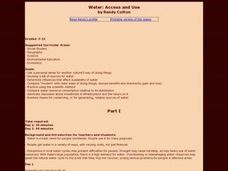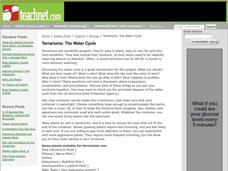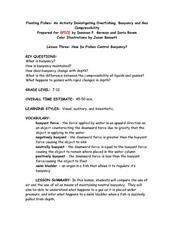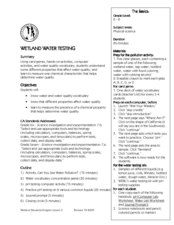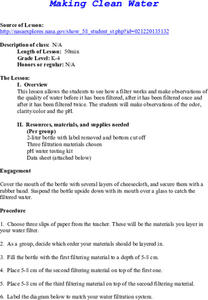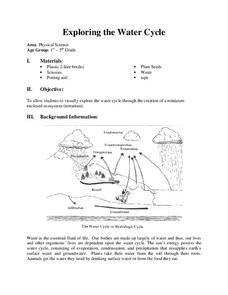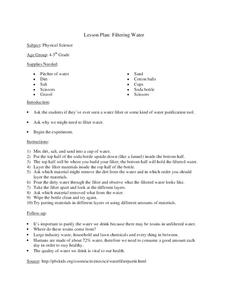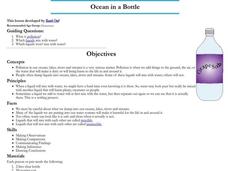Curated OER
Must Be Something in the Water
Students research water pollution and create a class guide to raise the public's awareness about this issue. They write papers analyzing the effectiveness of the guide after it is read by members of the community.
Curated OER
Water Taste Test
Students investigate the differences in drinking water from different municipalities and store brands. They record clarity, odor and taste descriptions in a blind taste test then compare their results as class.
Curated OER
Water Speed and Erosion
Fourth graders investigate the process of water erosion. They observe the roots of a plant and discuss the concept of erosion. Next, in small groups they conduct an experiment to observe how water erodes soil on a stream table, and...
Curated OER
Water: Access and Use
Students get a personal sense for another culture's way of doing things. Develop a list of sources for water. Practice using the scientific method. Examine means for conserving, or for generating, reliable sources of water.
Curated OER
The Water Cycle
Learners create terrariums in containers in order to study the Water Cycle. They examine how the terrarium maintains life in the closed environment.
Institute of Electrical and Electronics Engineers
Water Rocket Launch
How do rockets fly? Teams design, build, and launch a rocket made from a two-liter bottle to explore forces on a rocket such as Newton's Laws of Motion. During the design phase, young engineers draw a diagram of their rocket and include...
Institute of Electrical and Electronics Engineers
Water Fountain
Thorough instructions are given to guide you through making a demonstration hydraulic pump from two plastic soda bottles. After using the resource to teach your class about Pascal's and Bernoulli's principles, turn them loose in groups...
Foundation for Water & Energy Education
How is Flowing Water an Energy Source? Activity C
Can the force of falling water through a tube vary by altering the diameter of the tube or its height? That is what physical scientists aim to discover in this activity, the third in successively more revealing activities on the power of...
Exploratorium
Descartes' Diver
Pique interest in water pressure, demonstrate buoyancy, and explore water displacement concepts with a homemade Cartesian diver. You may want to change the name of the toy, however, as is is not documented the Rene Descartes actually...
Curated OER
Floating Fishes: How do Fishes Control Buoyancy?
Playing with balloons, water, oil, and bottles help put this lesson over the top! Participants use air-filled balloons in water tanks to experience gas compression. They also use oil-filled bottles to experiment with buoyancy. Included...
Curated OER
Designing a 2-liter Pop Bottle Piece to be Used for Water Rockets
Students design and create water rockets using recycled materials. In this technology lesson, students measure and sketch their project design before drawing them using SolidWorks. They construct the bottle as accurately as possible.
Curated OER
Go to the Source- Your Town's Tap Water
Students investigate their town's tap water. In this water quality lesson, students complete a simple taste-testing experiment and online research to investigate tap water.
Curated OER
Wetland Water Testing
Students examine the different properties that affect water quality. In this pollution lesson students play a game, complete a hands on activity and computer lab.
Curated OER
Tornado in a Bottle
Best as an introductory lab, this "tornado in a bottle" experiment has learners trying out various methods of getting water in a bottle to create a "tornado." Using a simplified scientific method, they create a hypothesis before...
Curated OER
No Impact Project: Water
Students use the "No Impact Project" to analyze the consumption of water. In this water consumption lesson, students discuss the pros and cons of tap water or bottled water. Students read about chemicals in water and watch a video clip...
Safe Drinking Water Foundation
To Filter or Not to Filter
Drinking clean water can be taken for granted. Explore the process and high cost of filtering water with a water pollution and filtration activity. Young scientist build a filtration system to filter polluted water, examine the economics...
Radford University
Can I Create a Line/Curve of Best Fit to Model Water Drainage?
Learners collect data on the amount of water left in a bottle over time. They graph the data to determine whether the scatter plot shows a curved or straight relationship. Group members then determine an equation for the curve of best...
Curated OER
Non-Compressibility of Water
Young scholars will observe a property of water. In this inquiry-based properties of air lesson, students observe how a change in water pressure impacts the positioning of an eye-dropper in the water container and they make hypotheses...
Curated OER
Making Clean Water
Students examine water samples assess the quality of each sample by examining the color/clarity, smell, pH, etc. of each Then they filter the water samples once and assess water quality a second time. finally they filter the samples a...
Curated OER
Cleaning Water: How Filters Work
Learners construct their own water filter to obtain clean water. In this filtration lesson, students produce tainted water in order to properly filter it with filtration devices made in class.
Curated OER
The Water Cycle
Fourth graders explore changes in water forms. In this water cycle lesson, 4th graders build a water cycle model and monitor it for 2 weeks in order to understand that water changes state as it moves through the cycle.
Curated OER
Exploring the Water Cycle
Students investigate the water cycle. In this water cycle lesson, students create an ecosystem within a 2-liter bottle. Students record scientific observations as they observe the water cycle within their ecosystem.
Curated OER
Filtering Water
Students investigate the need for filtered water. In this filtered water lesson plan, students explore the health hazards posed from consuming unfiltered water. Students construct a water filtration device.
Curated OER
Ocean in a Bottle
Students investigate pollution in water. In this pollution activity, students participate in an experiment to simulate water pollution. Students observe how the water reacts to the "pollution."





